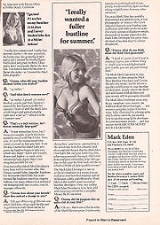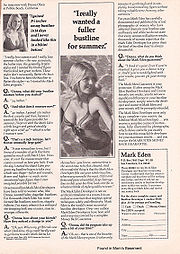
Mark Eden bust developer
Encyclopedia

San Francisco, California
San Francisco , officially the City and County of San Francisco, is the financial, cultural, and transportation center of the San Francisco Bay Area, a region of 7.15 million people which includes San Jose and Oakland...
, that promised to enlarge a woman's breast
Breast
The breast is the upper ventral region of the torso of a primate, in left and right sides, which in a female contains the mammary gland that secretes milk used to feed infants.Both men and women develop breasts from the same embryological tissues...
s. Jack Feather, a California based figure salon entrepreneur, was the promoter of the device. The product was widely marketed in women's magazines during the 1960s and 1970s, making claims such as, "For thousands, Mark Eden has transformed flat bustlines into firm, shapely fullness."
The product
The product consisted of a regimen of exercises using a clamshell-like device with a spring to provide resistance. The device and the regimen were never illustrated or described in the advertisements, which instead usually contained pictures of women showing their breasts. To the extent that the product had any effects at all, it worked by enlarging the pectoral muscles and latissimus dorsi, which could increase the circumference of the exerciser's bustline without actually enlarging breasts. Spokeswomen for the product included June WilkinsonJune Wilkinson
June Wilkinson is an English model and actress, known for her appearances in Playboy magazine and in films of the 1960s...
, the Playboy centerfold, who appeared in one edition of the product's documentation.
Mail fraud
Starting in 1965, the United States Postal ServiceUnited States Postal Service
The United States Postal Service is an independent agency of the United States government responsible for providing postal service in the United States...
repeatedly attempted to shut the Mark Eden business down, claiming that its advertising was false and misleading
False advertising
False advertising or deceptive advertising is the use of false or misleading statements in advertising. As advertising has the potential to persuade people into commercial transactions that they might otherwise avoid, many governments around the world use regulations to control false, deceptive or...
. The Postal Service first ruled that the claims made for the Mark Eden bust developer in its advertising constituted mail fraud in 1966, ruling that the claims made in the original Mark Eden advertising "far exceed puffing
Puffery
Puffery as a legal term refers to promotional statements and claims that express subjective rather than objective views, which no "reasonable person" would take literally...
", and that the advertisements contained "material misrepresentations", given that "(t)here is substantial evidence that the representations as set out in the attached copy of the advertisement involved in this case are false;" and "(t)hey are the kind of representations that would invite women to buy the device."
Protracted litigation between the Mark Eden business and the Postal Service was the result, leading to a consent decree
Consent decree
A consent decree is a final, binding judicial decree or judgment memorializing a voluntary agreement between parties to a suit in return for withdrawal of a criminal charge or an end to a civil litigation...
and a modification of the language of the advertisements, which the Postal Service later claimed had been violated. The Mark Eden corporation then brought suit against the Postal Service, and won an injunction
Injunction
An injunction is an equitable remedy in the form of a court order that requires a party to do or refrain from doing certain acts. A party that fails to comply with an injunction faces criminal or civil penalties and may have to pay damages or accept sanctions...
forbidding the Postmaster from impounding
Confiscation
Confiscation, from the Latin confiscatio 'joining to the fiscus, i.e. transfer to the treasury' is a legal seizure without compensation by a government or other public authority...
the device and funds received from its sale; this decision was affirmed on appeal in 1970.
The Mark Eden bust developer was one of several body and exercise products marketed by Feather, who also sold various other slimming and body modification products such as "Slim-Jeans", an "Astro-Trimmer", a "Sauna Belt", and in the 1980s, the Cambridge Diet
The Cambridge Diet
The Cambridge Diet is a weight management programme ranging from 415 to 1500 kcal/day. It is manufactured in the UK and complies with all current UK and EU legislation, guidance and directives...
. Finally, in 1981, Feather was indicted on 11 counts of mail fraud, and the Mark Eden bust developer disappeared from the market. Feather was made to pay a $1.1 million fine.
Impact
Screenwriter Nora EphronNora Ephron
Nora Ephron is an American film director, producer, screenwriter, novelist, playwright, journalist, author, and blogger.She is best known for her romantic comedies and is a triple nominee for the Academy Award for Writing Original Screenplay; for Silkwood, When Harry Met Sally... and Sleepless in...
wrote of her experiences with the Mark Eden bust developer in an essay, "A Few Words about Breasts", originally published in Esquire
Esquire (magazine)
Esquire is a men's magazine, published in the U.S. by the Hearst Corporation. Founded in 1932, it flourished during the Great Depression under the guidance of founder and editor Arnold Gingrich.-History:...
in 1972; the essay appears in her collection Crazy Salad. Lenny Bruce
Lenny Bruce
Leonard Alfred Schneider , better known by the stage name Lenny Bruce, was a Jewish-American comedian, social critic and satirist...
incorporated the device into his comedy routine; a recorded performance is included in the retrospective collection Let the Buyer Beware. The Mark Eden advertisements have been cited as examples of misleading language in advertisements by educators who seek to improve critical thinking
Critical thinking
Critical thinking is the process or method of thinking that questions assumptions. It is a way of deciding whether a claim is true, false, or sometimes true and sometimes false, or partly true and partly false. The origins of critical thinking can be traced in Western thought to the Socratic...
skills.

